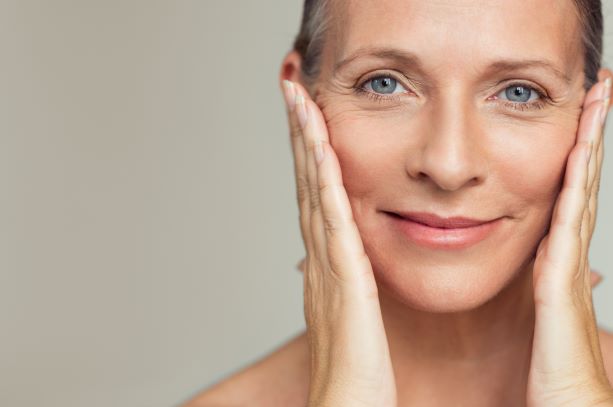
The Fascinating World of Skin
Our skin is a marvel of nature, covering about 20 square feet in adults and consisting of roughly 300 million cells. As the body’s largest organ, it’s not just a protective barrier – it’s a living, breathing entity that reflects our overall health and well-being.
The path to achieving that coveted glow needs understanding the intricate interplay of factors that influence our skin’s appearance and health. From the foundations of skin health to advanced treatments and technologies, we’ll cover it all in this comprehensive guide.
Understanding Skin Structure
Our skin consists of three main layers: the epidermis, dermis, and hypodermis. Each layer plays a crucial role in maintaining our skin’s health and appearance.
The Epidermis
The epidermis is our skin’s outermost layer and our first line of defense against environmental stressors. Here we find melanocytes, the cells responsible for our skin color, and where the process of cell turnover occurs.
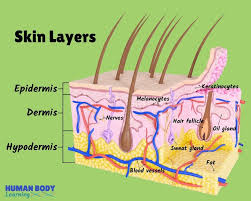
On average, our skin cells regenerate every 28 days, a process that slows as we age.
The Dermis
Beneath the epidermis lies the dermis, home to collagen and elastin fibers that give our skin it’s strength and elasticity. It’s also where we find our sweat glands, hair follicles, and blood vessels.
The dermis plays a crucial role in maintaining skin hydration and regulating body temperature.
The Hypodermis
The hypodermis, composed mainly of fat cells, provides insulation and gives our skin it’s plump, youthful appearance.
Understanding these layers is key to addressing specific skin concerns. For instance, fine lines and wrinkles primarily affect the epidermis and upper dermis, while loss of facial volume as we age is more related to changes in the hypodermis.
The Skin Microbiome: Your Skin’s Invisible Ally

One of the most exciting areas of skincare research in recent years has been the discovery of the skin microbiome. This diverse ecosystem of microorganisms living on our skin plays a crucial role in maintaining skin health and protecting against harmful pathogens.
A 2018 study published in Nature Communications revealed that the skin microbiome actively talks with our immune system, helping to maintain skin barrier function and even influencing how our skin responds to environmental stressors.
Probiotic and Prebiotic Skincare
Probiotic and prebiotic skincare products support a healthy skin microbiome. These products can help balance the skin’s pH, reduce inflammation, and even improve conditions like acne and eczema.
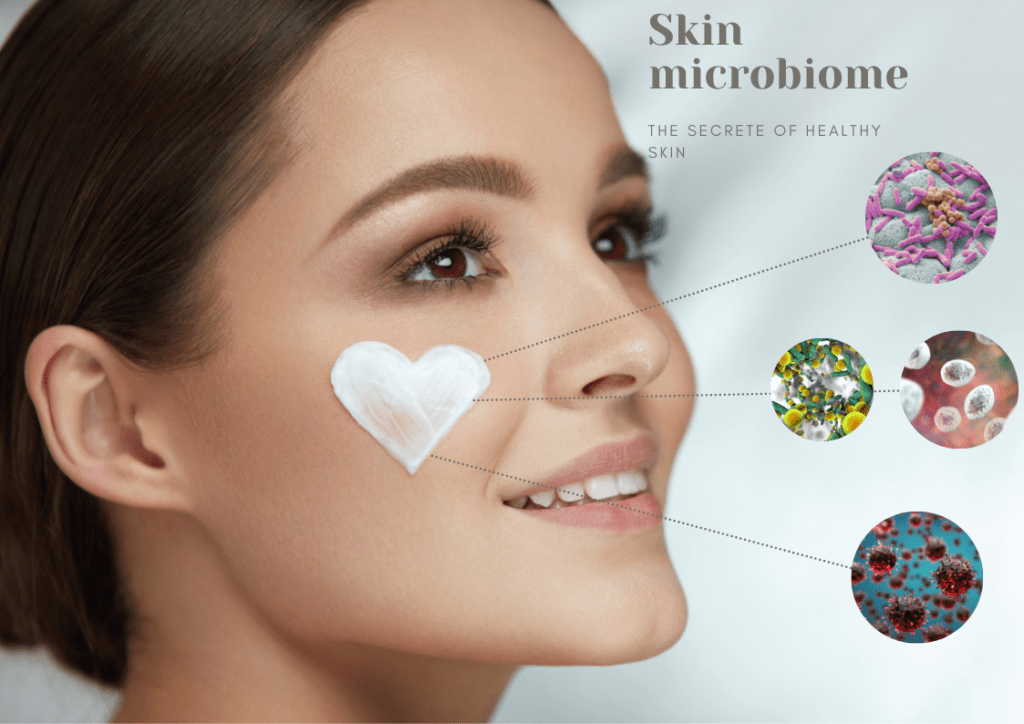
When introducing new products to your routine, pay attention to how they affect your skin’s balance. Harsh cleansers or over-exfoliation can disrupt the delicate microbiome, leading to irritation and other skin issues.
The Importance of Hydration
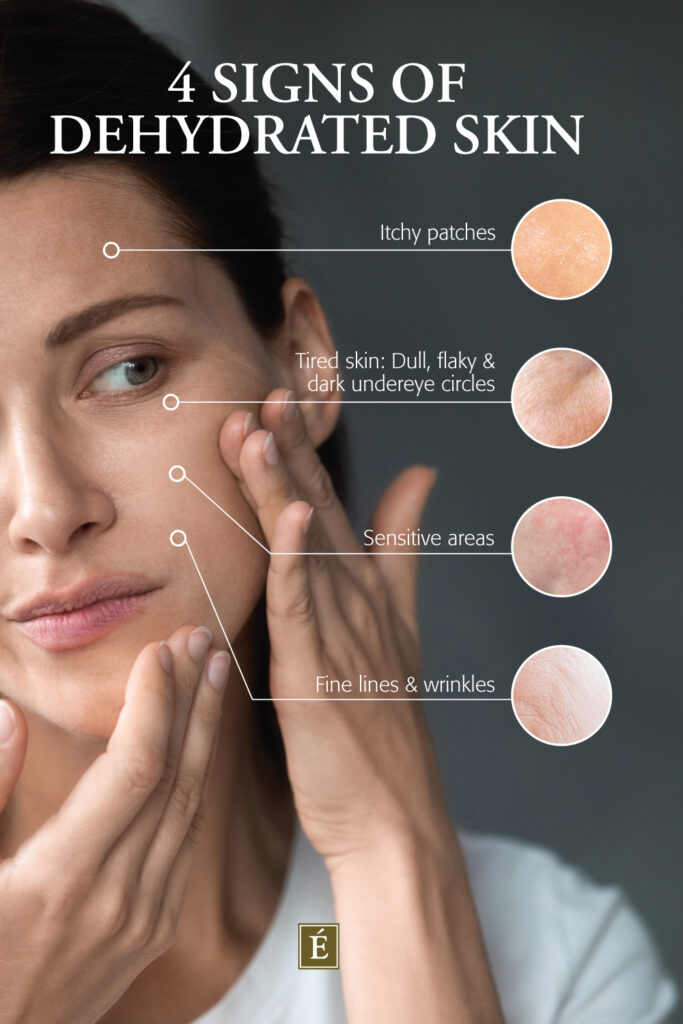
Hydration for radiant skin goes far beyond internal water consumption. While staying hydrated is undoubtedly important, the key to truly moisturized skin comes from understanding and supporting your skin’s natural moisture barrier.
The skin’s moisture barrier, also known as the acid mantle, is a thin, slightly acidic film on the skin’s surface that helps keep moisture in and harmful bacteria out. When this barrier is compromised, it can lead to dryness, sensitivity, and a host of other skin issues.
Hyaluronic Acid: A Hydration Powerhouse
One of the most effective ingredients for supporting skin hydration is hyaluronic acid. This powerful humectant can hold up to 1000 times it’s weight in water, drawing moisture into the skin and helping to plump fine lines and wrinkles.
For most effectiveness, apply hyaluronic acid to damp skin and follow immediately with a moisturizer to seal in the hydration.
Ceramides: The Skin Barrier’s Best Friend
Ceramides are lipid molecules naturally present in our skin and play a crucial role in maintaining the skin barrier. As we age, our natural ceramide levels decrease, which is why incorporating ceramide-rich products into your routine can be a game-changer for achieving that coveted dewy glow.
Sun Protection: The Foundation of Healthy Skin
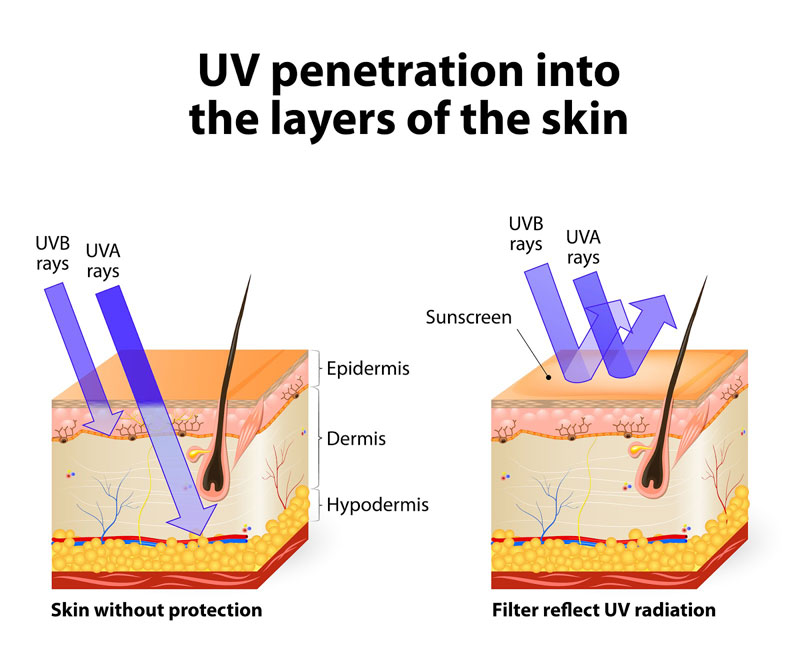
UV radiation is responsible for up to 80% of visible skin aging, including wrinkles, pigmentation, and loss of elasticity. This makes sun protection a year-round necessity for maintaining radiant, youthful skin.
When choosing a sunscreen, look for broad-spectrum protection that guards against both UVA and UVB rays. UVA rays penetrate deeper into the skin and are primarily responsible for premature aging, while UVB rays cause sunburn and play a key role in the development of skin cancer.
Beyond UV: Protecting Against Blue Light
Recent research has shown that visible light and infrared radiation can also contribute to skin damage and aging. Many dermatologists now recommend sunscreens that also protect against blue light, especially for those who spend a lot of time in front of screens.
For optimal protection, apply sunscreen as the last step in your morning skincare routine, and don’t forget often-overlooked areas like the ears, neck, and backs of hands.
Nutrition and Skin Health
The link between diet and skin health is becoming increasingly clear. A 2015 study published in the Journal of Clinical and Aesthetic Dermatology found that a diet rich in antioxidants and omega-3 fatty acids can significantly improve skin elasticity and hydration.
Skin-Loving Foods

Here are some foods to incorporate into your diet for radiant skin:
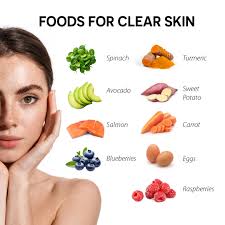
- Fatty fish like salmon, mackerel, and sardines are rich in omega-3 fatty acids, which help maintain skin moisture and reduce inflammation.
- Avocados are packed with healthy fats and vitamin E, both of which are essential for maintaining skin health and fighting free radical damage.
- Sweet potatoes are a great source of beta-carotene, which your body converts to vitamin A—a crucial nutrient for skin cell turnover and repair.
- Green tea is rich in polyphenols, powerful antioxidants that can protect against sun damage and reduce inflammation.
- Tomatoes contain lycopene, an antioxidant that has been shown to protect against sun damage and may even help prevent wrinkles.
While topical skincare products are important, true skin health starts from within. A balanced diet rich in vitamins, minerals, and antioxidants provides your skin with the building blocks it needs to maintain it’s radiance and resilience.
Advanced Treatments: When Skincare Meets Technology
While a solid at-home skincare routine is the foundation of healthy skin, sometimes we need a little extra help to address specific concerns or achieve more dramatic results. Advanced treatments mix cutting-edge technology with skincare science to deliver impressive results.
Microneedling: Stimulating Collagen Production
Microneedling has gained popularity in recent years. This procedure involves creating tiny punctures in the skin using fine needles, which triggers the skin’s natural healing response and stimulates collagen production.
A 2018 study published in the Journal of Clinical and Aesthetic Dermatology found that microneedling can significantly improve skin texture, reduce fine lines and wrinkles, and even help with issues like acne scarring.
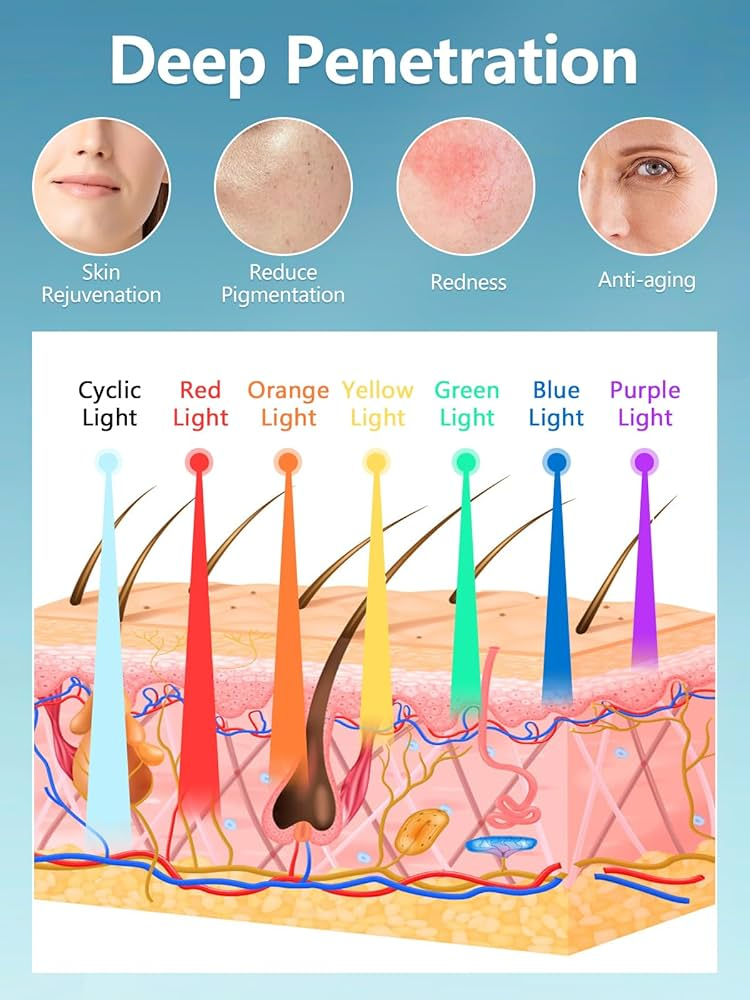
LED Light Therapy: Harnessing the Power of Light
Different wavelengths of light can target various skin concerns:
- Blue light is effective in treating acne by killing acne-causing bacteria
- Red light stimulates collagen production and can help reduce signs of aging
- Near-infrared light penetrates deepest into the skin and can help with wound healing and reducing inflammation
While at-home LED devices are available, for best results, consider professional treatments where higher-intensity lights can be used safely under expert supervision. For more information on the Best Red light Therapy Devices click here.
The Rise of Personalized Skincare
Personalized skincare takes into account person factors such as skin type, concerns, lifestyle, and even genetics to create tailored skincare routines.
Some companies now offer DNA testing to decide your skin’s genetic predispositions, allowing for truly personalized product recommendations. Others use artificial intelligence and detailed questionnaires to create custom formulations.
While the jury is still out on the effectiveness of DNA-based skincare, the principle of personalization is sound. Our skin is unique, and what works for one person may not work for another.
Pay attention to how your skin responds to different products and treatments, and be willing to adjust your routine accordingly.
Common Pitfalls to Avoid
In our quest for perfect skin, it’s easy to fall into some common traps. Here are a few pitfalls to watch out for:
Over-exfoliation
While exfoliation is important for removing dead skin cells and promoting cell turnover, too much can damage your skin barrier. Stick to exfoliating 1-2 times a week, and be gentle!
Neglecting Your Neck and Chest
These areas are often forgotten in skincare routines, but they can show signs of aging just as much as your face. Extend your skincare routine to include these areas.
Mixing Too Many Active Ingredients
Using many products with active ingredients like retinoids, vitamin C, and acids can lead to irritation. Introduce new actives slowly and consider using them on alternate days.
Ignoring the Importance of Sleep
During deep sleep, our body produces growth hormone, which is essential for skin repair and collagen production. Aim for 7-9 hours of quality sleep each night.
Touching Your Face Too Often
Our hands come into contact with countless bacteria throughout the day. Touching your face often can transfer these bacteria, leading to breakouts.
Adapting Your Skincare Routine to Different Scenarios
Your skin’s needs can change based on various factors, including the season, your menstrual cycle, stress levels, and even your travel schedule. Learning to adapt your skincare routine to these changing needs is key to maintaining radiant skin year-round.
Seasonal Skincare
In winter, you might need to switch to a richer moisturizer to combat dry, cold air. During summer, on the other hand, you might opt for lighter, oil-free formulations and increase your use of antioxidants to protect against increased sun exposure.
Travel Skincare
If you’re traveling, especially to a different climate, be prepared to adjust your routine. Pack travel-sized versions of your essentials, and consider adding a hydrating face mist to your in-flight skincare routine to combat the drying effects of airplane cabins.
Keep a skincare journal to track how your skin responds to different products and environmental factors. This can help you identify patterns and make more informed decisions about your skincare routine.
Building on the Basics: Advanced Techniques for Skin Mastery
Once you’ve mastered the basics of cleansing, moisturizing, and sun protection, you can start to incorporate more advanced techniques into your routine. Here are a few to consider:
Facial Massage
Regular facial massage can improve circulation, promote lymphatic drainage, and help your skincare products penetrate more effectively. Tools like gua sha stones or jade rollers can enhance these benefits.
Skin Cycling
This involves rotating your active ingredients throughout the week to maximize benefits while minimizing irritation. For example, you might use a retinoid one night, an exfoliating acid the next, followed by two nights of recovery with just gentle, hydrating products.
Multi-masking
This technique involves applying different masks to different areas of your face based on their specific needs. For example, you might use a clay mask on your T-zone to absorb excess oil, while applying a hydrating mask to your cheeks.
Layering Serums
By carefully layering serums with different active ingredients, you can address many skin concerns in one routine. The general rule is to apply water-based serums before oil-based ones.
Remember, advanced doesn’t always mean complicated. Sometimes, the most effective routines are those that are consistent and tailored to your skin’s specific needs.
Exercises to Reinforce Your Skincare Knowledge
Skin Type Assessment
Spend a week observing how your skin behaves throughout the day. Does it get oily?
Dry?
Combination? This will help you better understand your skin type and choose suitable products.
Product Ingredient Analysis
Choose three of your current skincare products and research their top five ingredients. What are their benefits?
Are there any potential irritants?
Patch Testing
Before introducing a new product to your routine, do a patch test. Apply a small amount of the product to your inner arm and observe for 24-48 hours for any adverse reactions.
Skincare Routine Audit
Write down your current skincare routine, including the order in which you apply products. Research whether this order is optimal for ingredient efficacy and make adjustments if necessary.
Stress and Skin Connection
For one week, rate your stress levels each day and note any changes in your skin. This can help you understand how stress affects your skin and when you might need to give your skin extra TLC.
The Role of Antioxidants in Skin Health
Antioxidants play a crucial role in protecting our skin from free radical damage, which can lead to premature aging and other skin issues. Free radicals are unstable molecules that can damage our skin cells, leading to inflammation, collagen breakdown, and even DNA damage.
Top Antioxidants for Skin Health
- Vitamin C: This powerhouse antioxidant fights free radicals and helps boost collagen production and can help fade dark spots.
- Vitamin E: Often paired with vitamin C for enhanced effectiveness, vitamin E helps protect cell membranes and can improve skin hydration.
- Niacinamide: A form of vitamin B3, niacinamide can help improve skin barrier function, reduce inflammation, and even out skin tone.
- Green Tea Extract: Rich in polyphenols, green tea extract has anti-inflammatory properties and can help protect against UV damage.
- Resveratrol: Found in red grapes and berries, resveratrol is a potent antioxidant that can help protect against environmental damage and may have anti-aging benefits.
Incorporating antioxidant-rich products into your skincare routine can help protect your skin from daily environmental stressors and support overall skin health.
The Science of Skin Aging
Understanding the biological processes behind skin aging can help us make more informed decisions about our skincare routines and lifestyle choices.
Intrinsic vs. Extrinsic Aging
Skin aging can be categorized into two types:
- Intrinsic aging: This is the natural aging process determined by our genetics.
It’s characterized by a gradual decline in cell turnover, collagen production, and skin elasticity.
- Extrinsic aging: This type of aging is caused by external factors such as sun exposure, pollution, smoking, and poor diet.
It’s responsible for up to 90% of visible skin aging.
Key Factors in Skin Aging
- Collagen and Elastin Breakdown: As we age, our bodies produce less collagen and elastin, leading to sagging skin and wrinkles.
- Oxidative Stress: Free radical damage accumulates over time, leading to cellular damage and visible signs of aging.
- Glycation: This process occurs when excess sugar molecules attach to collagen and elastin fibers, making them stiff and less elastic.
- Hormonal Changes: Fluctuations in hormones, particularly during menopause, can significantly impact skin health and appearance.
Understanding these processes can help us target our skincare routines more effectively and make lifestyle choices that support healthy aging.
The Impact of Lifestyle on Skin Health
While a good skincare routine is essential, our lifestyle choices play a significant role in our skin’s health and appearance.
Sleep and Skin Health
During sleep, our body goes into repair mode, producing growth hormones that are crucial for skin cell regeneration. Lack of sleep can lead to increased cortisol levels, which can break down collagen and lead to premature aging.
Exercise and Skin
Regular exercise improves circulation, which helps deliver oxygen and nutrients to skin cells. It also promotes the production of endorphins, which can reduce stress and potentially improve skin conditions like acne.
Stress Management
Chronic stress can wreak havoc on our skin, leading to increased inflammation, breakouts, and even exacerbating conditions like eczema and psoriasis. Incorporating stress-reduction techniques like meditation, yoga, or deep breathing exercises can have a positive impact on your skin health.
Alcohol and Smoking
Both alcohol and smoking can dehydrate the skin and lead to premature aging. Smoking, in particular, damages collagen and elastin, leading to wrinkles and sagging skin.
By making positive lifestyle choices, we can support our skin health from the inside out, complementing our topical skincare efforts.
The Future of Skincare
As technology continues to advance, the future of skincare looks exciting and promising. Here are some trends and innovations to watch:
AI and Machine Learning in Skincare
Artificial intelligence and machine learning are being used to analyze skin conditions and recommend personalized skincare routines. Some companies are developing apps that can analyze your skin using just a selfie, providing tailored product recommendations and tracking your skin’s progress over time.
3D-Printed Skincare
The concept of 3D-printed skincare products tailored to person needs is gaining traction. This technology could allow for the creation of custom-formulated products that address many skin concerns in a single application.
Microbiome-Focused Skincare
As our understanding of the skin microbiome grows, we’re likely to see more products designed to support and balance our skin’s natural ecosystem. This could include prebiotics, probiotics, and postbiotics specifically formulated for topical use.
Sustainable and Eco-Friendly Skincare
With increasing awareness of environmental issues, the skincare industry is moving towards more sustainable practices. This includes zero-waste packaging, waterless formulations, and ingredients sourced through regenerative agriculture.
Ingestible Skincare
The concept of beauty from within is gaining momentum, with more companies developing supplements and functional foods designed to support skin health from the inside out.
As these innovations continue to develop, they promise to change how we approach skincare, offering more personalized, effective, and sustainable solutions for achieving and maintaining healthy, radiant skin.
Frequently Asked Questions
What causes premature skin aging?
Premature skin aging can be caused by various factors, including excessive sun exposure, smoking, poor diet, lack of sleep, and chronic stress. UV radiation from the sun is the primary external factor leading to early signs of aging like wrinkles and age spots.
How often should I exfoliate my skin?
The frequency of exfoliation depends on your skin type and the exfoliation method. Generally, 1-2 times a week is enough for most skin types.
However, those with sensitive skin may need to exfoliate less often, while oily skin types might benefit from more frequent exfoliation.
Can diet really affect my skin?
Yes, diet plays a significant role in skin health. A balanced diet rich in antioxidants, omega-3 fatty acids, and vitamins can help maintain skin elasticity, hydration, and overall health.
Conversely, a diet high in processed foods and sugar can contribute to inflammation and premature aging.
Is it necessary to use a toner in my skincare routine?
Toners are not essential for everyone, but they can be beneficial depending on your skin type and concerns. Modern toners can help balance skin pH, provide hydration, and prep the skin for better absorption of subsequent skincare products.
How long does it take to see results from a new skincare product?
The time it takes to see results from a new skincare product can vary depending on the product and your skin’s condition. Generally, it takes about 4-6 weeks to see noticeable changes, as this is roughly the time it takes for your skin to finish a full cell turnover cycle.
Can stress really affect my skin?
Yes, stress can have a significant impact on skin health. Chronic stress can lead to increased inflammation in the body, which can exacerbate skin conditions like acne, eczema, and psoriasis.
It can also speed up the aging process by breaking down collagen and elastin.
Is it possible to shrink pores?
While it’s not possible to permanently change the size of your pores, as this is largely determined by genetics, you can minimize their appearance. Regular exfoliation, proper cleansing, and using products with ingredients like niacinamide or retinoids can help keep pores clear and make them appear smaller.
How does lack of sleep affect skin?
Lack of sleep can have several negative effects on the skin. It can lead to increased production of stress hormones, which can break down collagen. It also reduces the skin’s ability to repair itself overnight, potentially leading to premature aging, dullness, and dark circles under the eyes.
Are natural skincare products always better?
Natural skincare products are not inherently better or safer than synthetic ones. Both natural and synthetic ingredients can be beneficial or harmful depending on the specific ingredient and how it’s formulated. What matters most is the quality of the ingredients and how they interact with your skin.
How does pollution affect skin health?
Pollution can have significant negative effects on skin health. Airborne pollutants can generate free radicals on the skin, leading to oxidative stress.
This can result in premature aging, inflammation, and exacerbation of skin conditions like acne.
Using antioxidant-rich products and thorough cleansing can help protect against pollution damage.
Key Takeaways
- Understanding your skin’s structure and needs is basic to achieving radiant skin.
- The skin microbiome plays a crucial role in maintaining skin health and should be supported, not disrupted.
- Hydration involves supporting your skin’s natural moisture barrier, not just drinking water.
- Sun protection is essential for maintaining youthful, healthy skin.
- A balanced, nutrient-rich diet is crucial for skin health.
- Advanced treatments and technologies can complement a good skincare routine for enhanced results.
- Personalized skincare approaches are the future of effective skin management.
- Adapting your skincare routine to different scenarios is key to maintaining skin health year-round.
- Building on skincare basics with advanced techniques can help you achieve skin mastery.
- Continuous learning and self-observation are crucial for optimizing your skincare routine.